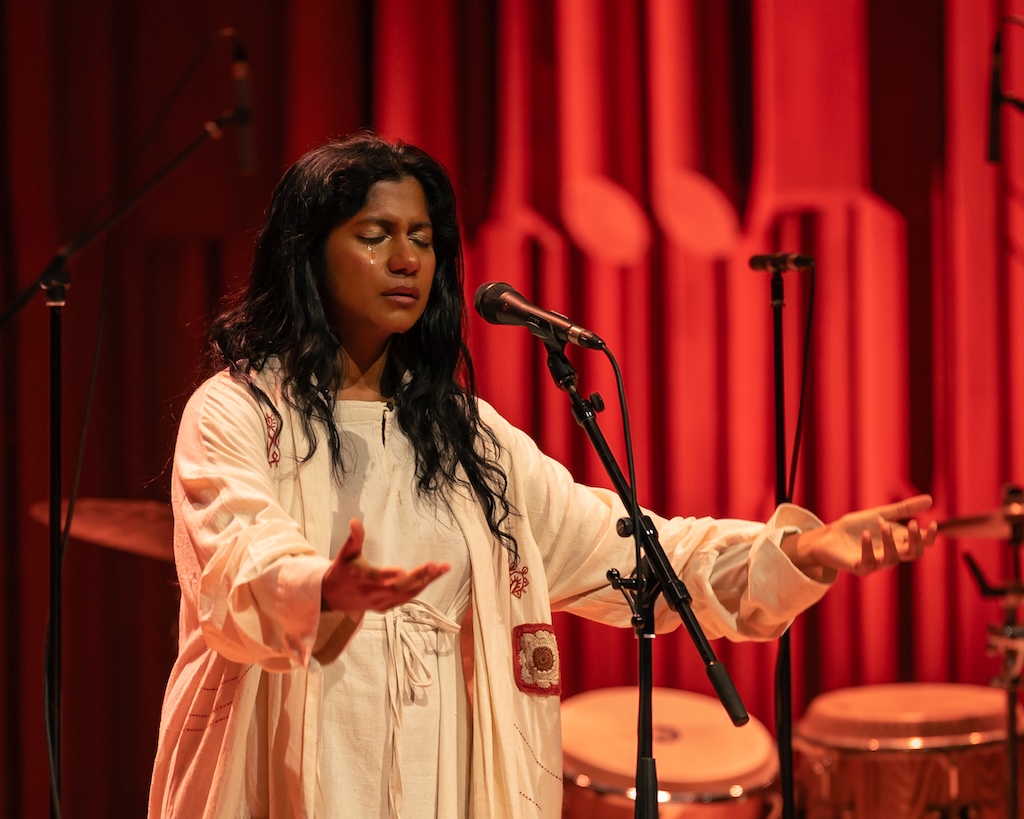At the start or her show, the white-robed singer Ganavya does something unusual: while other performers usually warm their audience up before suggesting they sing along, she plunges straight in, a minute or so into chanting “a love supreme”, and gets everyone to join her in what can only be described as a communal act of devotion. This is a kind of high-wire daring, and it works, suggesting as well that she's assured of a large group of listeners for whom she can do no wrong.
Now well-established as a purveyor of spiritual jazz and traditional South Indian chants, born and raised in New York to Tamil parents, Ganavya explores a fertile ground in which genres and cultures mix, a living example of fruitful diversity that appeals most strongly to those who seek to fill the void that pure entertainment can only temporarily remedy. Her music is all about healing – and love, and she uses her voice, rich in microtonal modulations and heart-felt emotion, to elevate those who gather to hear her sing.
I first heard her a few weeks back, at the wonderful We Out Here festival in Dorset, where she wove her magic to great effect. It was a surprisingly moving experience. In the confines of the Barbican’s Main Hall, while there were moments that were similarly touching, I confess that I was disappointed.
Ganavya was supported by a talented group of musicians: Charles Overton and Miriam Adefrid on harps, Max Ridley on double bass, and Jay Verna on piano. Their presence is minimal, providing a discrete and drone-rich background texture rather than enabling their considerable individual gifts to shine. For this London concert, she’d invited a series of friends who joined her on stage. It was, she said, a way of paying respect to people she loved, and from whom she had learned about music and life. These included the 30-strong Love Supreme Choir, and several solo singers, Immanuel Wilkins on mellifluous alto sax, weaving in and out of her vocal lines, the versatile singer and writer Sam Amidon with whom she performed a jointly-written song that was touching in its quiet modesty, and the percussionist Kweku Sumbry whose deft playing of djembe and other drums felt a little out of place.

Though she protested that she wasn't selling us a cult and insisted that there was no religion in her act, Ganavya’s strength as a performer comes from deep spiritual roots and intent. She was good at fostering a spirit of communion with her audience, involving them as often as possible in refrains, mantras and other easily taught vocal phrases. There were many references to Alice Coltrane, the great saxophonist’s widow and a founding spirit of the spiritual jazz that Coltrane was crucial in developing in the 1960s. "Trane", as has been pointed out, drew much inspiration from his own roots in gospel – the transcendental and often ecstatic church music he participated in as a child. The art of taking risks and pushing boundaries that allow for letting go.
Ganavya treads a different path, rarely risking the abandon that "feeling the spirit" in a gospel meeting makes possible. Her music is tempered and meditative, unlike, for instance, the wilder spiritual jazz played alongside her at the We Out Here Festival by the American musician Khalil El’Zabar. In her respectful rendering of the “Om Namah Shivaya” mantra in the company of her parents, she honours the Lord of the Dance, a Hindu god with links to the Ancient Greek God Dionysos, who drove his worshippers to a craziness that reduced the uptightness of the ego to dust. In the context of an open-air festival, Ganavya’s laid-back approach to music-making encouraged a sense of floating in the world that brought serenity and peace. In the more urban and concrete-armoured context of the Barbican, something more explosive was most probably required: a more vehement call to spiritual union, reaching beyond the spiritual comfort that failed to fire the audience up in the way that Shiva might have required.













Add comment